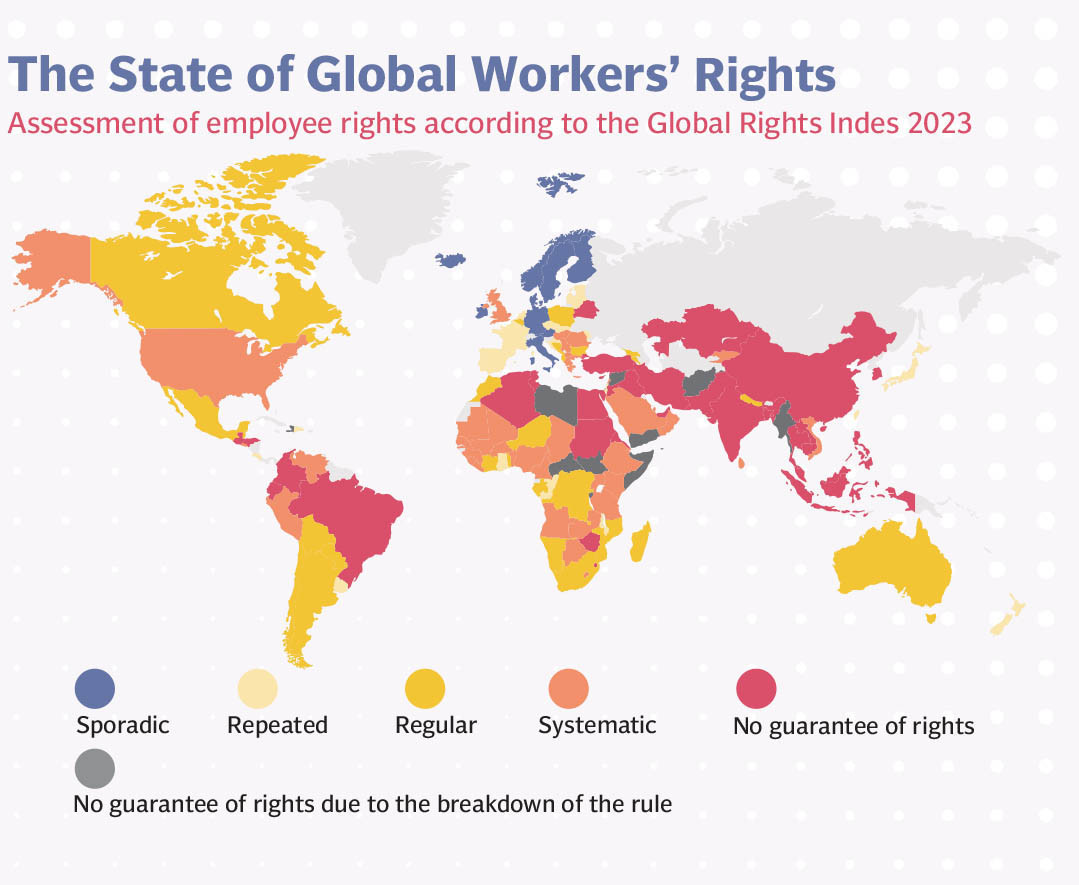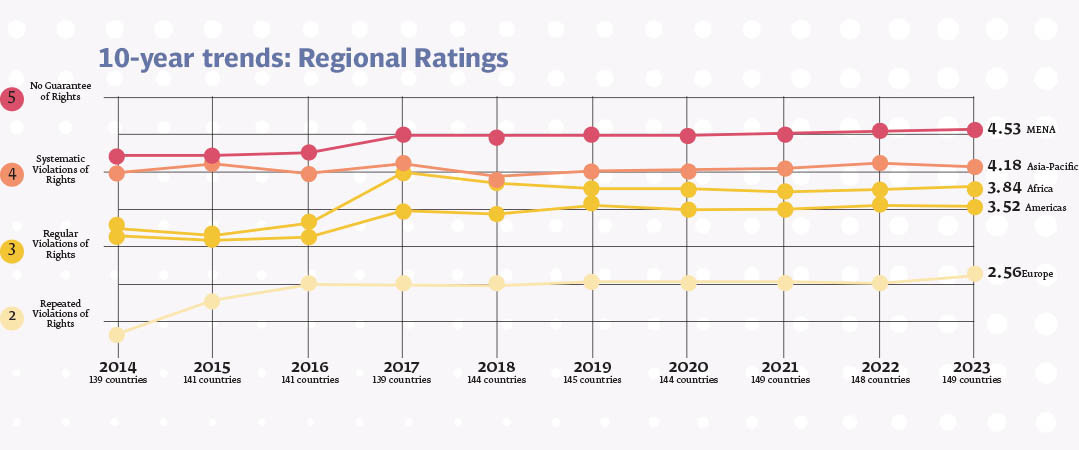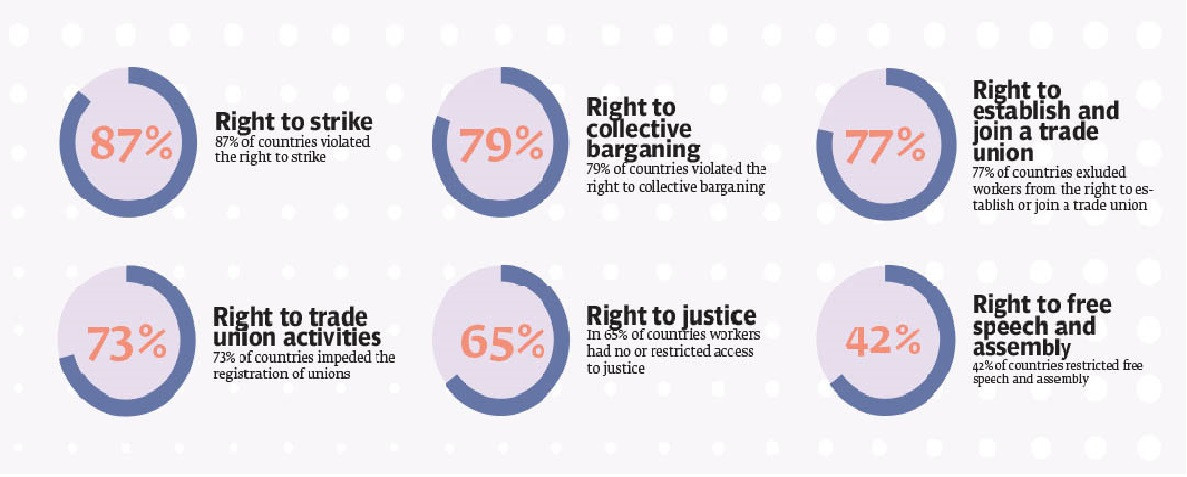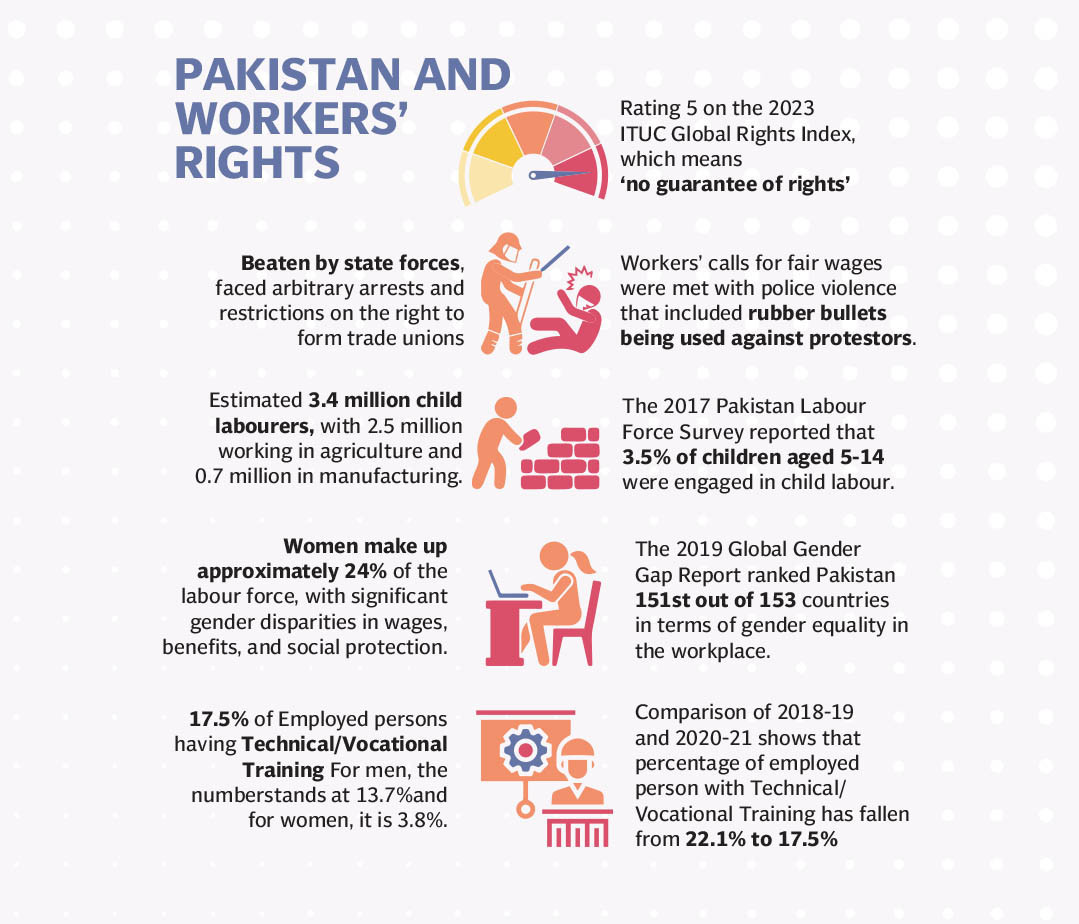Shazia works 12 hours a day, six days a week, earning a meagre salary of 30,000 rupees per month. In the garment factory where she works, the 35-year-old is constantly harassed by her supervisor and faces discrimination because of her gender. She is also denied her rightful benefits, including overtime pay, pension and paid leave.
Shazia's story is a stark reminder of the labour rights issues faced by millions of adult workers in Pakistan. Struggling to make ends meet, working in hazardous conditions, and facing exploitation and abuse, Pakistan’s labour force is denied the dignity and respect they deserve as contributors to our society.
Millions of workers like Shazia, be it men, women, or children, are denied their basic rights, forced to toil in hazardous conditions for minimal wages, and exploited by those who prioritise profit over people. In the 2023 ITUC Global Rights Index, Pakistan was ranked the second-worst country at number five, indicating "no guarantee of rights".
Workers in Pakistan face countless challenges, from exploitation and abuse to lack of access to education and healthcare. Despite these obstacles, they continue to fight for their rights, organizing and advocating for better working conditions, higher wages, and social protections. However, when unions raise their voice to demand their rights, they are often met with force and intimidation by the employers. Union leaders are harassed, arrested, and even fired from their jobs, leaving workers vulnerable and powerless.
From the factories and workshops of Karachi to the farms and fields of rural Punjab, the struggle for labour rights is a daily reality for millions of Pakistanis. It's a struggle that requires the attention and action of activists and policymakers.

Child labour – a compulsion
12-year-old Ali's day begins before sun-up. He rubs the sleep from his eyes, his small frame bracing for the long hours of physical labour that lie ahead. Ali’s first task of the day is milking the cow. After that, he loads the fresh milk into crates on his bicycle and sets off to deliver it to homes in his neighbourhood.
Despite his young age, Ali works long hours, exposed to the harsh sun and dusty streets, earning a meager income to support his family. Millions of children in Pakistan, like Ali, are denied their childhood, education, and basic rights.
According to a UN report released on World Day Against Child Labour, an estimated 3.4 million children aged five to 17 are engaged in labour in Pakistan. This accounts for a substantial percentage of the total child labour in South Asia, with Pakistan ranking third in the region after India and Bangladesh.
“I used to go to school but then one day we were not able to pay the fee and I had to eventually work to make ends meet,” said Ali, the eldest sibling to four sisters. “My father already works too much and I didn’t want to burden him. He was not in favour of my leaving school and finding work at this age, but I had to as we were struggling to make ends meet,” he shared.
The boy didn’t know much work, so he started at a milk shop. Later the owners shifted him to the farm for milking the cows and delivery.
In Pakistan, child labour is particularly prevalent in the rural economy and agriculture sector, which hires the highest percentage of children in employment. Many children in Pakistan are vulnerable to various forms of violence and exploitation, including economic exploitation and child trafficking.
According to a UN report, only 34 percent of children under five in Pakistan are registered at birth, making it difficult to determine their age and leaving them vulnerable to exploitation. The report also notes that 41 percent of employment of 15 to 17-year-olds in Pakistan is hazardous in nature.
Family labour also accounts for a significant percentage of employment in Pakistan, with a majority of working 10 to 14-year-olds engaged in family work. Girls in Pakistan continue to lag behind boys in school attendance, with a gender disparity of 15 percent for 10 to 17-year-olds.
Child labour remains a persistent issue in Pakistan, perpetuating cycles of poverty and exploitation. Efforts are needed to address the root causes of child labour, improve access to education, and protect the rights of children in Pakistan.

The gender gap
In the garment factory, Shazia stands on the quality check line, her eyes scanning the seams and stitches for precision. She has to keep her mouth shut about any problems she faces in the workplace and like other women colleagues, suffer in silence because of the fear of being fired.
Her male counterparts and managers make every day difficult for her. They often make snide comments, questioning her ability to perform tasks as well as men, and even go so far as to cut her salary unjustifiably. The male managers also subject the female workers to humiliation, reprimanding them in front of their colleagues for taking short breaks to rest their aching feet or grab a quick lunch.
"I remember one time, I was working overtime to meet a deadline, and my feet were bleeding from standing for so long," Shazia recalled. "I asked my manager if I could take a short break to bandage my feet, and he yelled at me in front of everyone, saying I was being 'lazy' and 'weak' and that there are many women fitter than me waiting to get a job here. I was humiliated, but I didn't dare say anything back. I just kept working, even though I was in pain. That's what we're forced to do here - put up with whatever they throw at us, or risk losing our jobs."
The rise in male unemployment in Pakistan has forced many women to become the primary breadwinners for their families, taking on grueling jobs in factories like the one Shazia is employed at. But this shift in dynamics has also led to exploitation, as factory owners and managers take advantage of the desperate situation. With a long line of women waiting to take any available job, the managers know they can get away with mistreating their employees. This toxic environment has created a culture of fear and silence, where women are forced to endure discrimination and harassment in order to put food on the table.
Sir Syed University of Engineering & Technology (SSUET) recently held an awareness seminar on the ‘Protection against Harassment of Women at the Workplace Act, 2010’ which aimed to create a safe and respectful work environment for women in Pakistan. SSUET Registrar Syed Sarfraz Ali reiterated the institution's commitment to upholding women's dignity and fundamental rights, stating, "We always supported gender equality and justice."
Federal Ombudsperson for Protection Against Harassment Fauzia Waqar stressed that harassment is a serious issue that forces women to abandon their education or career. She noted, "Harassment at the workplace is not just a violation of one's dignity but also a barrier to women's right to work and ability to contribute to society. There is a need for protective measures, citing the constitution's mandate to safeguard women's and children's rights.”
Civil society organisations can play their part in ensuring women in the labour force are treated with respect and given due rights. Aurat Foundation launched a project to promote the social and economic empowerment of women garment workers. The project focuses on enhancing their technical and professional skills, improving workplace conditions, and addressing occupational segregation.
"The project is also aimed at breaking the occupational segregation and precarious forms of employment for women and promoting social and economic rights of woman garment workers,” said Sara Anam of the Aurat Foundation, which aims to promote women's participation, economic justice, and poverty alleviation.

Dangerous occupational hazards
Pakistan's workplaces are notoriously hazardous, with thousands of workers succumbing to injuries and fatalities every year. According to the International Labour Organization (ILO) report for 2020-21, 2.2 million people die every year due to work-related accidents or illness, while more than 270 million workers are injured and an estimated 160 million suffer work-related illness.
In Pakistan, the situation is equally dire. The same report shares that Pakistan has one of the highest rates of workplace accidents in South Asia, with an estimated 12,000 workers dying annually due to occupational injuries and illnesses.
Muhammad Farooq is a victim of the dangers faced by workers in Pakistan's factories every day. "I was working on a machine without any safety guards or protective gear. Suddenly, my hand got caught in the machine and it was crushed. I was rushed to the hospital, but it was too late. My hand had to be amputated," Farooq recalled.
Farooq's experience is not an isolated one. Many workers in Pakistan face similar risks every day, with little protection or support from their employers or the government. "I was lucky to survive, but many others are not so fortunate," said Farooq. "We need better safety protocols and training in our workplaces to prevent these kinds of accidents from happening."
The lack of safety measures in Pakistan's workplaces is a systemic problem that goes beyond individual factories or industries. It is a reflection of a broader culture of neglect and disregard for workers' rights. "Employers prioritise profit over people, and the government turns a blind eye to the suffering of workers,” said Farooq.
The consequences of this neglect are devastating. Workers like Farooq are left to suffer the consequences of workplace accidents, while their employers escape accountability. "I am now unable to work and support my family. I feel like I have lost my dignity and my purpose in life," he added.
The Pakistan Labour Force Survey 2020-21 reveals that only 17.5 percent of employed persons have received technical or vocational training, with males fare slightly better at 13.7 percent and females lagging behind at 3.8 percent (Pakistan Labour Force Survey 2020-21). What's more, the percentage of employed persons with technical or vocational training has actually fallen from 22.1 percent in 2018-19 to 17.5 percent in 2020-21.
This lack of training and preparation leaves workers vulnerable to accidents and illnesses on the job. Many factories and industries neglect to provide their workers with proper safety gear and training, putting them at risk of serious harm. In fact, a study by the Pakistan Institute of labour Education and Research (PILER) found that over 70 percent of workers in Pakistan's manufacturing sector are not provided with safety equipment or training.
The Pakistani government has taken some steps to address the issue of workplace safety, but more needs to be done. The government must enforce labour laws and regulations more effectively, and hold employers accountable for providing safe working conditions. "We need a comprehensive overhaul of our labour laws and regulations. We need to prioritise workers' safety and well-being, and ensure that employers are held accountable for their actions," said Farooq while adding that there is no organisation that can help people like him in taking action against the companies.

Silenced voices
In Pakistan, the widespread use of third-party contracts has led to the exploitation of workers. "The major issue in Pakistan is that about 90 percent of employment is through third-party contracts, which allow industries to exploit workers. The contractors deny workers their rights, including Employees Old Age Benefit Institution (EOBI), social security, bonuses, and gratuities,” said Asadullah Memon, General Secretary of Sindh, Pakistan Workers Federation.
Despite Supreme Court rulings that deem third-party contracts impermissible, the practice persists, allowing employers to shirk their responsibilities and silence the workers. "Whenever workers attempt to form a union, they are told that they are not directly employed by the company, but rather through a third-party contract. This loophole prevents them from forming a union, silencing their voices and denying them the ability to advocate for their rights," Memon told The Express Tribune.
The 18th amendment has further complicated labour rights in Pakistan, devolving labour laws to the provinces and resulting in disparate social security laws across regions. "Prior to the 18th amendment, there was a single trade union law applicable across Pakistan, the Industrial Relations Ordinance (IRO). However, after the amendment, labour rights were devolved to the provinces, which resulted in each province creating its own laws. Balochistan has the Balochistan Industrial Relations Act, Punjab has the Punjab Industrial Relations Act, and KPK has its own Industrial Relations Act. This has led to differences in social security laws across provinces, causing numerous issues,” explained Memon.
The devolution of the EOBI to the provinces has also raised concerns, as workers may face difficulties in accessing their benefits upon retirement. "The issue is that if a worker from KPK or Balochistan is working in Karachi and retires, they would have to either stay in Karachi to receive their benefits or forfeit them and return to their home province, as the laws are not applicable across provinces. Therefore, it is essential that EOBI remains under federal jurisdiction," he said.
The struggles for labour rights have intensified since the 18th amendment, requiring advocacy efforts to be replicated at the provincial level. Memon shared that since the 18th amendment, their struggles have intensified. “Previously, we only had to lobby the federal parliament to influence labour laws and policies. However, now we must separately approach each province and start from scratch to convince them to implement favorable laws and policies,” he added.
Highlighting the struggles of workers in Pakistan and the efforts of Workers Solidarity to amplify their voices, Memon said, "We organise protests, social media campaigns, and collaborate internationally to raise awareness about their issues. We even reach out to the ILO to escalate cases and pressure governments to take action."
The Pakistan Workers Organisation (PWF) also provides critical legal assistance to its members and other workers who have been unfairly terminated from their employment. Memon informed that the PWF provides legal assistance to its members and other workers who have been unfairly terminated from their employment and support them in filing cases, responding to legal documents, and fighting court battles.
Memon shared the PWF's initiative to establish a separate Labour Court, consolidating 21 laws into one comprehensive code. "Recently, the PWF has been working to establish a separate Labour Court that consolidates 21 laws into one comprehensive code. This initiative aims to bring all labour laws under a single umbrella, protecting workers from various industries, including agriculture, home-based workers, and online workers. This will ensure they receive basic labour rights, EOBI, and social security benefits," he informed.
However, the process of unionisation is fraught with obstacles, with employees often being misled about their employment status. "The biggest obstacle in forming a union is often the employees themselves, as they are misled into believing they are employed by a third-party contractor, rather than the company directly. This misconception is fueled by the company owners, who are the primary hurdle in union formation,” he said.
Memon pointed out that the collusion between some labour department officials and company owners, which weakens the workers' case. "Additionally, some individuals within the labour department collude with company owners, informing them about workers' attempts to unionise and even revealing the names of union leaders. When the employee list is submitted to the court, the names of union leaders are often excluded, weakening the case,” he added.
By providing comprehensive support, the PWF strives to create a more just and equitable work environment where workers' voices are heard and their rights are respected.
Silencing workers protests
On November 11, 2022, police arrested 70 healthcare workers, including union leader Shamim Ara, for participating in a strike and protest. The workers, members of the All Sindh Lady Health Workers & Employees Union (ASLHWEU), were demanding better working conditions and a health risk allowance. The police used force to disperse the protest, detaining the workers overnight. The women were released the next morning, while 12 doctors and paramedics were held until November 13, when a magistrate ordered their release.
Teachers in Pakistan faced police violence and mass arrests during protests over pay and job stability in 2022. Despite peaceful demonstrations, riot police used force, arresting over 250 protesters. The teachers demanded regularisation and annual increments, but were met with violence on multiple occasions. The police used water cannons, batons, and tear gas, resulting in injuries and arrests. The protests were consistently met with excessive force, despite the teachers' peaceful demands for fair treatment.
Certain workers were excluded from labour protection and the right to organise, including agricultural workers (except in Sindh and Balochistan), domestic workers, home-based workers, and workers in the informal sector. This meant that a large portion of agricultural workers, as well as workers in other industries, were not protected by labour laws and had limited ability to form unions or advocate for their rights. Only a few agricultural worker unions existed, all in one province.
Call to action
The stories of Shazia, Ali, Farooq, and countless other workers in Pakistan paint a stark picture of exploitation and abuse. It's a reality where workers are denied their fundamental rights, forced to toil in hazardous conditions, and silenced by oppression. But it's also a reality that can be changed.
The government, employers, and labour officials must come together to enforce labour laws and regulations effectively. This means providing safe working conditions, education, training, and safety equipment to all workers. It means ending child labour, gender discrimination, and harassment once and for all. It means ensuring fair compensation, social security, and benefits for all workers, regardless of their employment status.
The government must support unionisation and collective bargaining, and hold employers accountable for their actions. Only then can one can ensure that workers' voices are heard and their rights are respected.
